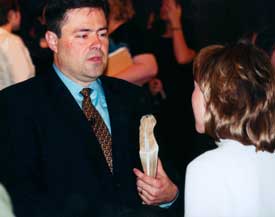JACKSON, Tenn. — April 10, 2002 — Some pastors might be concerned if they moved into a church with 500 members and after eight years of work had only a total of 350 members remaining. However, Mark Dever, pastor of Capitol Hill Baptist Church in Washington D.C., and founder of the Center for Church Reform, considers this a strong move forward in the life of his church.
Since becoming a Christian in his teens, Dever has fought against Christian nominalism in the church.
“Soon after becoming a Christian, I realized that there were far more people on the official membership records of my church than those who actually attended and took an active part in church life,” said Dever.
This concerned Dever so much that he undertook a project of his own to find out when this gap between membership and active involvement took place. He researched the church records for months, tracing the weekly attendance and the weekly membership each week for the last 60 years of his church. It became all too clear that while the membership had continued to go up each year, the attendance had remained virtually the same.
Dever then made a chart that graphed this inconsistency, and without asking anyone’s permission, placed it on the wall of his church. The chart was not well received by the church, but Dever, while still a teenager, had begun the fight for church reformation that he carries on today.
Church membership is something that should be taken very seriously, said Dever. When he first arrived at Capitol Hill Baptist Church, it had a membership of 500, but only 130 people were actually attending. Though membership has dropped to 350, there are now between 400 and 500 people in attendance each week.
The author of Nine Marks of a Healthy Church, Dever lays out the marks or principles that should be evident if a church is living a healthy life from a biblical standpoint. One of these points is a Biblical understanding of church membership. Membership is not simply the record of a statement once made or of affection toward a familiar place, said Dever. It must be the reflection of a living commitment, or it is worthless and dangerous.
In his book, Dever says that according to a Southern Baptist Convention study, the typical Southern Baptist church has 233 members and 70 in attendance at the Sunday morning worship service. These are the kinds of statistics that Dever is fighting to change within the church.
Though his first priorities are his pastoral duty and his family, Dever also reaches out to pastors and seminary students, encouraging them to develop churches within the Biblical model that Christ intended. Dever recently visited 51���� and spoke face to face with many of the students who are preparing to become pastors.
 |
Mark Dever briefly visited with students and faculty after recently speaking in chapel. Here he speaks with Wendy Veazey ('01), an enrollment counselor for the university. |
“I think any time you read Mark Dever’s book, the first question that any one asks is how would you implement these nine marks into a church?” said Union senior Michael Kirby, a Christian studies major who will be attending New Orleans Baptist Theological Seminary this August. “It was great to be able to talk with him and ask him questions about what he does at Capitol Hill. He's totally changed the way that I view the pastoral ministry and the life of the church as a whole.”
Although he says he realizes he can’t change everything about his church at once, Kirby said that he plans to follow Dever’s advice, and preach expositionally from the word. According to Kirby, that is the key to Dever’s message.
“Once people become grounded in the scripture and what it means to be a follower of Christ and a member of his body, the other elements such as evangelism and placing a high value on church membership, come naturally,” said Kirby.
Dever says that he has seen progress through his work.
“I’ve seen an increasing value in Biblical theology, expositional preaching, evangelism and church membership,” said Dever.
His Center for Church Reform receives calls and emails every day from pastors who want their church to become even more Biblically grounded, said Dever.
“I believe that the level of nominal Christianity that is so common today will not survive as our world continues to become more and more secularized,” said Dever. During the 1950’s it was a social benefit to go to church, or at least to be a member, but these social advantages are quickly falling away. He believes that Christianity and church membership do not have the same social value that they once did and in some cases are even frowned upon.
“Once the social advantages and cultural expectations are gone, there will be fewer reasons for nominal Christianity to exist,” said Dever.
According to their mission statement, the Center for Church Reform seeks to change the manner in which pastors and leaders understand the local church. One of their goals is to refocus attention on the value of healthy congregations and to reconnect careful biblical theology with church practice.
